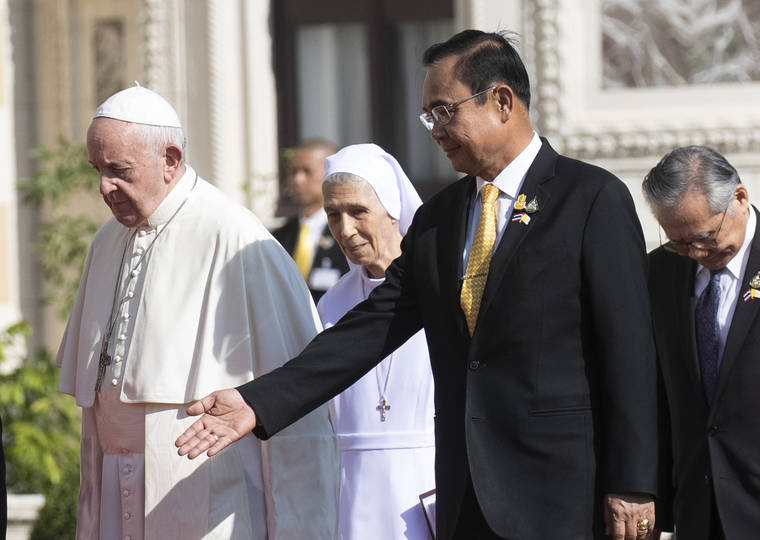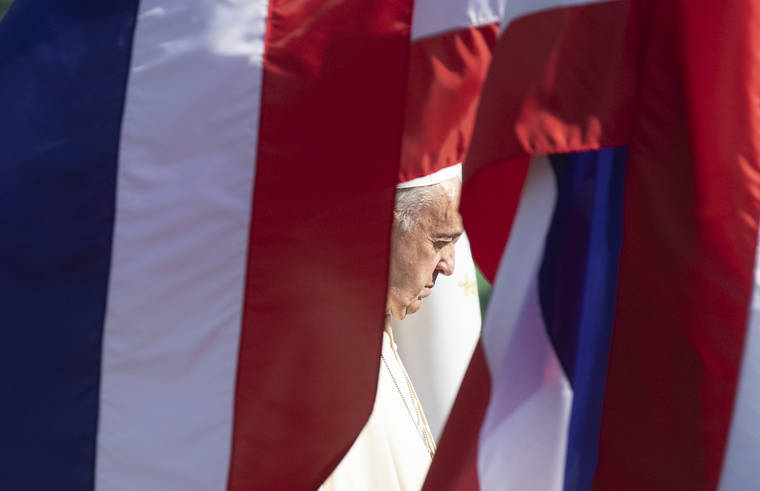BANGKOK — Pope Francis called for migrants to be welcomed and for women and children to be protected from exploitation, abuse and enslavement as he began a busy two days of activities in Thailand on Thursday.
Francis pleaded for action against one of the region’s greatest scourges, human trafficking to fuel the forced labor and sex trade industries, as he began a weeklong visit to Asia.
He praised the Thai government’s efforts to fight human trafficking in a speech delivered at host Prime Minister Prayuth Chan-ocha’s Government House offices. But he appealed for greater international commitment to protect women and children “who are violated and exposed to every form of exploitation, enslavement, violence and abuse.”
He called for ways to “uproot this evil and to provide ways to restore their dignity.”
“The future of our peoples is linked in large measure to the way we will ensure a dignified future to our children,” he said.
The United Nations considers Thailand a key trafficking destination as well as a source of forced labor and sex slaves, who are trafficked at home or abroad. The U.N. anti-trafficking agency says migrants come from Laos, Myanmar, Cambodia or Vietnam, with Cambodian women and children in particular trafficked to beg in Thai cities.
The U.S. State Department has faulted Thailand for failing to fully crack down on traffickers who induce young Thai girls into pornography, as well as the exploitation, including via debt bondage, of migrant workers in commercial fishing enterprises.
The Thai government has insisted it has made significant progress in cracking down on human trafficking and has vowed continued cooperation with international bodies to improve.
Francis has made the fight against human trafficking one of the cornerstones of his papacy, calling it a crime against humanity. Under his express wishes, the Vatican has hosted several conferences on eradicating trafficking, featuring women freed from forced prostitution. And during his papacy, an international network of religious sisters, Talitha Kum, has gained greater prominence following decades of quiet efforts to rescue women from traffickers.
While Thailand has a tradition of taking in migrant laborers and sheltering people fleeing from danger in neighboring countries, it also has a checkered history of deporting foreigners who are in the country illegally, even if they are recognized by the United Nations as refugees who are fleeing persecution. In addition, up until it signed an agreement with the U.N. refugee agency this year, Thailand held child asylum-seekers in detention centers.
In his comments made alongside Thai authorities, Francis thanked the country for its historical role welcoming migrants from across the region, who are drawn to Thailand for economic opportunities. But he said all countries must do more to resolve the conflicts that fuel the “tragic exodus” of forced migration.
“May every nation devise effective means for protecting the dignity and rights of migrants and refugees, who face dangers, uncertainties and exploitation in their quest for freedom and a decent life for their families,” he said.
Francis had a busy schedule on his first full day of activities of his weeklong tour, which will also take him to Japan.
During a meeting with Thailand’s Supreme Patriarch of Buddhism, Francis committed the Catholic Church to working more with Thailand’s majority Buddhists to launch projects to care for the poor and the environment.
Francis’s visit was the second time a pope has called on the spiritual leader of Thailand’s Buddhists, after St. John Paul II in 1984.
There are fewer than 400,000 Catholics among Thailand’s 65 million people, yet Francis said they nevertheless have enjoyed freedom in their religious practice. He called for increasing charitable initiatives to improve fraternity and to help the poor “and our much-abused common home.”
His visit to Wat Ratchabophit was followed by a visit to a Catholic hospital. He wraps up the day with a private audience with Thailand’s recently crowned King Maha Vajiralongkorn, and a public Mass at Bangkok’s National Stadium.
Friday’s agenda is far more church-based, with meetings with local Thai clergy, Asian bishops and separately a meeting with leaders of different Christian denominations and other faiths.



